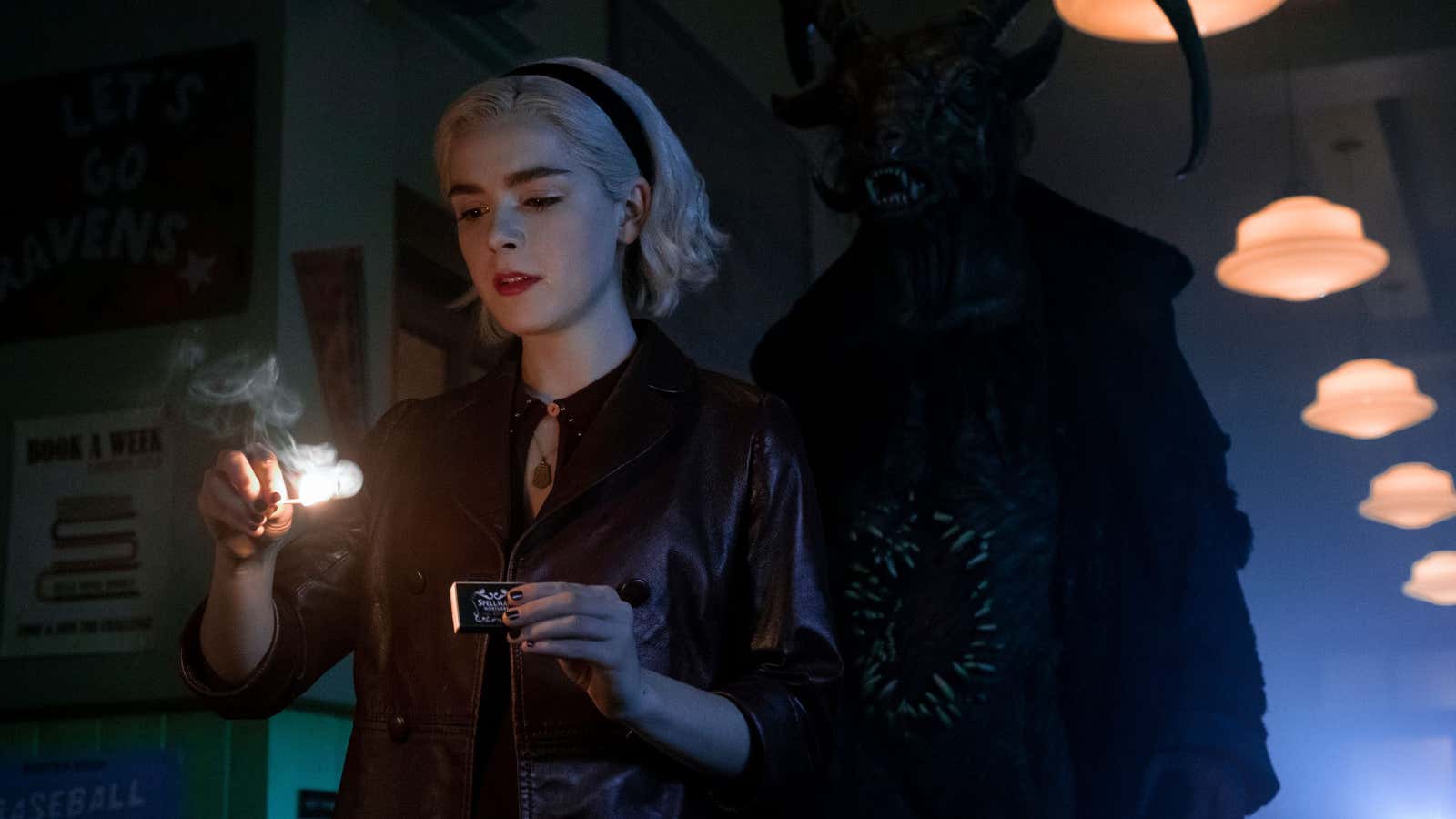Netflix’s The Chilling Adventures of Sabrina bills itself as a show about the occult, in which a half-witch, half-mortal teenager must navigate her life in two different worlds. In its forthcoming second season (to be released on April 5), however, the preoccupation is not so much with what it means to belong to both, but what it means to be female in either.
Where the mortal world has the ordinary coterie of nasty adolescent schoolboys and overbearing male authority figures, the magical world is even more retrograde. Everything takes place under the dominion of the caprine Dark Lord, and the warlocks at the top of magical society’s hierarchy will stop at nothing to maintain the male-dominated status quo.
This point is hammered home time and time again: Sabrina’s fiery Aunt Zelda is reminded that, as a bride, she should walk after—and not beside—her new husband. Chastened and ashamed, she takes her place behind him, eyes fixed on the ground. An earlier episode shows Sabrina campaigning for the position of magical student-president as “Top Boy,” and facing the swift opprobrium of those in charge. Throughout it all, the Dark Lord maintains his metaphysical—and sometimes just physical—grip over proceedings, mainly by releasing his wrath upon the show’s female characters.
Gender may be a frequent theme, but the show isn’t always clear in what it wants to say about it. For the most part, Sabrina comes down on the side of righteous indignation—that misogyny is wrong, and those who perpetrate it are clearly the baddies. But sometimes tangled plotting can muddy the message. Events set up as significant, such as Sabrina’s campaign for Top Boy, are suddenly abandoned, with no clear lessons or ostensible character development for anyone concerned. Things that were unfair continue to be unfair; no one learns from their mistakes; comeuppance never comes up.
Where there are sudden feminist breakthroughs for these toxic male types, they seem to come out of nowhere. A bully suffers a horrible “accident,” for example, and the result is a quick about-turn and apology to those he has had a hobby of terrorizing—though it’s not clear why he’d connect the two, or feel moved to repent.
In its original 1960s form, Sabrina the Teenage Witch was a brightly colored comic book series in the Archie Comics universe, later adapted by the TV network ABC into a cheerful, family-friendly live-action comedy starring Melissa Joan Hart. Netflix’s latest incarnation is darker, more premium and less bubblegum, with much loftier aspirations than its predecessors.
The trouble is, although the show seems to be getting closer to what it wants to be, two seasons in, Sabrina still doesn’t seem to know precisely who its audience is. Its rather unsubtle commentary on toxic masculinity and sexism feels appropriate for a 13+ Teen Vogue reader, but it coexists alongside genuinely “adult” themes, by turns sexy and terrifying. It’s hard to imagine a viewer simultaneously wide-eyed enough for the former and mature enough for the latter. (This is not a new complaint: Reviews of the first season, even as they praised its most spellbinding moment, noted the messy inconsistencies of a show that “struggles to figure out exactly what its tone is, and how to balance its darkness and its campiness.”)
Still—though some of the show’s forays into gender critique are a little ham-fisted, there’s one area in which it manages to check virtually every box. The first season alluded to a forthcoming arc for character Susie Putnam, played by the non-binary teen actor Lachlan Watson, with heavy hints that a significant change was still to come. In the second season, these whispers reach a roaring point, culminating in a transition of sorts for the character.
Without giving too much away, the storyline is deftly handled by Watson, with clear writing that—for the most part—asserts the validity of the character’s journey while acknowledging that the world may not always know how to accommodate it with much kindness.
Watson’s performance is subtle and genuine, and a highlight of the show. Even a decidedly odd (and, from a plot perspective, quite pointless) Tarot-themed episode is made believable and touching by Watson’s authentic performance, which earned praise from critics and trans fans alike.
Transmasculine characters on the whole get far less screen time than their female counterparts: Watson’s casting and execution is a masterclass in how to do it right.
